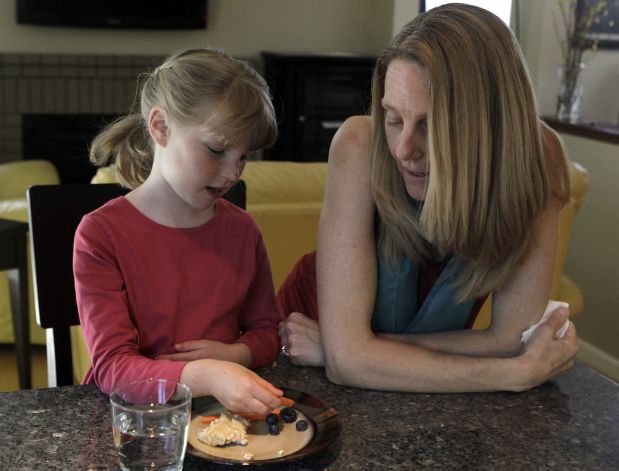Chemist says omitting MSG cured daughter's autism
Stacy Finz
Updated 5:46 pm, Wednesday, March 19, 2014
-
 Brooke Reid, 7, enjoys an afternoon snack with her mother, Katherine, at their home in Fremont. Katherine Reid says all signs of Brooke's autism vanished when the compound monosodium glutamate was eliminated from her diet. Photo: Paul Chinn, The Chronicle
Brooke Reid, 7, enjoys an afternoon snack with her mother, Katherine, at their home in Fremont. Katherine Reid says all signs of Brooke's autism vanished when the compound monosodium glutamate was eliminated from her diet. Photo: Paul Chinn, The Chronicle
(03-19) 10:30 PDT SAN FRANCISCO --
Katherine Reid, a Bay Area biochemist with a daughter who was autistic, believes she may have found an antidote to the neurodevelopment disorder - and it's as simple as changing a person's diet.
Well, actually, more like blowing it up.
Because there is no Food and Drug Administration-approved medical treatment for the core symptoms of autism, people have turned to homeopathic remedies, probiotics, invasive therapies and alternative diets.
It has become increasingly popular for parents of children with autism or attention-deficit/hyperactivity disorder to turn to gluten- and casein-free, or dairy-free, diets in hopes that it will make a difference.
But Reid's diet is different. She thinks what it comes down to, at least for some people with autism, is permanently eliminating just a single chemical compound known as monosodium glutamate, or MSG - an ingredient many people associate with Chinese food.
Actually, Reid said, the chemical is in nearly every processed food imaginable, but it only appears on food labels as MSG about 1 percent of the time. Instead, MSG is sometimes labeled as flavor or flavoring, soy protein, barley malt, pectin, corn starch or yeast extract, Reid said.
"We're getting an abundance of MSG," she said. "It's in 95 percent of processed food. And we don't need it in our diet - ever."
While there is no science to back up many of her claims, Reid said the most convincing evidence to her is the results she saw in her daughter. At age 7, Brooke is completely cured, Reid said. And from all outward appearances that seems to be true.
Research is sparse
Dr. Robin Hansen, professor of pediatrics at UC Davis and a developmental behavior pediatrician who recently led a study for the university's Mind Institute, said it's fairly common for parents to seek out alternative treatments for their children with autism. Nearly 7 percent of the children with autism they studied were on gluten- and casein-free diets.
"We don't have a lot of diet research to look at, because these studies are difficult to do," she said, describing the trickiness of monitoring a child's food intake in a double-blind study. "And no one has done an MSG study. But what we do have doesn't show a marked difference even with children with gastrointestinal problems."
Still, she wouldn't dissuade parents from trying as long as they make sure the diet is balanced and to keep in mind that it's a big undertaking.
For Reid, the journey was long, difficult and often heartbreaking, but ultimately a victory that persuaded her to quit her high-paying job and help other parents with what she learned, establishing the Fremont nonprofit foundation Unblind My Mind.
It started when Brooke was 2. Reid and her husband noticed that their daughter, the youngest of five, couldn't make human connections, had severe communication problems and threw tantrums that lasted for hours. She also had digestive issues and constipation - all hallmark signs of autism.
Reid told herself Brooke would grow out of it. Her husband, Paul Sauer, wasn't so sure. A cellular biologist, he began plugging Brooke's issues into search engines and perusing websites. One night he came home with information he had printed off the Internet about autism.
"Brooke displayed every characteristic on the list," Reid said. "I could check every box."
Looking for answers
They went through all the traditional channels, starting with their pediatrician. Their doctor agreed that something was wrong but didn't know where to direct them. So they hired a psychologist to test Brooke, and the results showed that she was moderately autistic with some severe learning disabilities, Reid said.
More: http://www.sfgate.com/health/article/Chemist-says-omitting-MSG-cured-daughter-s-autism-5329126.php